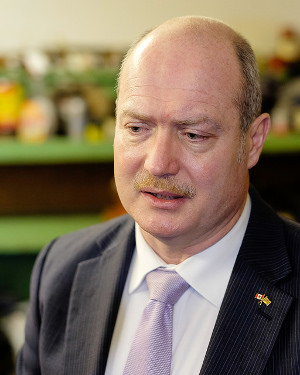
The British Columbia government has slashed in half the amount of revenue it expects to receive from a proposed liquefied natural gas industry since the February 2014 budget.
The BC Liberal government had previously promised LNG revenues would be used to create a prosperity fund that could be used to fund goals such as eliminating the provincial sales tax. Premier Christy Clark ran in the 2013 election with a "Debt Free B.C." slogan premised on building an LNG industry.
"The amounts of money are still significant," Finance Minister Michael de Jong told reporters in a briefing ahead of the bill's introduction in the legislature this afternoon. "If it takes an extra 10 or 15 years to pay down to the extent we'd like or eliminate the provincial debt... I'll take that criticism."
The LNG income tax rate will start at 3.5 per cent, moving up to five per cent in 2037 -- some two decades after the first plant is expected to be built. That's down from a top tier of seven per cent LNG tax that de Jong announced in February.
Slides from de Jong's presentation show that instead of paying $250 million a year in LNG income tax once it is up and running, a medium-sized facility producing 12 million tonnes of LNG per year would pay closer to $125 million a year.
After credits are applied, the facility will pay about $800 million to the province over its first 10 years in operation.
'Market's changed': de Jong
With the province hoping to have as many as five plants, LNG revenue would be about $400 million a year, or $4 billion over a decade.* The provincial budget is about $45 billion a year and the accumulated debt is in the neighbourhood of $65 billion.
The reduction in tax expectations was necessary because of the change since February in the market for natural gas, de Jong said. "The market's changed," he said. "We're still in a range where this is viable and potentially quite lucrative for all involved."
He also acknowledged that the rates are the result of a negotiation with proponents, noting that he predicted in February that the preference of people in the LNG industry would be a tax rate of zero. "Have they aggressively advanced arguments for why the tax should be reduced from the maximum amount we stipulated in February? Of course they have."
Asked why there was no indication of when money would go into the promised prosperity fund, de Jong said, "I prefer to think of the revenue stream to government in the overall sense." Once the revenues start coming in, it's up to the government to decide what to allocate to debt reduction and what to put in the promised fund.
Cutting the debt is a step-by-step process, that depends on both balancing the operating budget and capitalizing on the unique opportunity LNG represents, he said.
Market conditions 'well known': NDP critic
Bruce Ralston, the NDP's critic for natural gas, called out the "dramatic climb down" from LNG revenues projected just eight months ago. The budget projections were themselves a reduction from what the Liberals promised during the election, he said. "There's no possibility that they will achieve the grandiose goals that they set out in the election. There's absolutely no way."
The government claims conditions have changed since eight months ago, but the major shifts in the market were well known at the time, Ralston said. "They've retreated a long, long way," he said. "I think what we're interested in is a fair return for the citizens of British Columbia. I'm not sure that this tax regime constitutes a fair return."
Representatives of organizations promoting LNG who attended the announcement welcomed the certainty that the announcement gives them.
"We are of the view that the B.C. LNG tax framework announced by the government provides balance and consideration of the challenges faced by an LNG sector in B.C.," said a statement from LNG Canada. "We are pleased to have certainty on a final B.C. LNG tax framework and consider it an important input to our decision making process."
*Story corrected Oct. 27 at 12:45 p.m. ![]()
Read more: Energy, BC Politics, Environment















Tyee Commenting Guidelines
Comments that violate guidelines risk being deleted, and violations may result in a temporary or permanent user ban. Maintain the spirit of good conversation to stay in the discussion.
*Please note The Tyee is not a forum for spreading misinformation about COVID-19, denying its existence or minimizing its risk to public health.
Do:
Do not: